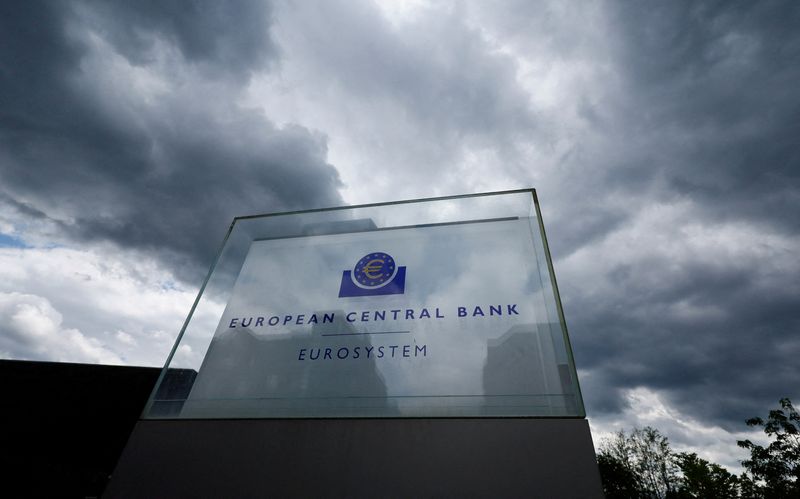By Balazs Koranyi and Francesco Canepa
FRANKFURT (Reuters) -The European Central Bank cut interest rates for the fourth time this year on Thursday and kept the door open to more easing as the euro zone economy is dragged down by political instability at home and the threat of a fresh U.S. trade war.
The ECB has been easing policy quickly for months as inflation worries have largely evaporated. The debate is now shifting to whether it is cutting rates fast enough to support an economy that is falling behind global peers and has been skirting recession for over a year.
Worried over this increasingly dark outlook, and what ECB President Christine Lagarde described as "uncertainty ... in abundance", a handful of policymakers even pushed for a bigger half-percentage-point rate cut to buffer the euro zone economy.
But they settled unanimously on 25 basis points, Lagarde said, taking the ECB's deposit rate, the benchmark for borrowing costs across the 20-nation currency bloc, to 3%.
The central bank also removed an earlier reference in its guidance to keeping interest rates sufficiently restrictive, which economists took as a sign that further policy easing is coming - perhaps as soon as January, as inflation is seen settling at the ECB's 2% target in early 2025.
"The disinflation process is well on track," Lagarde told a press conference. "The element which has changed ... is the downside risk, particularly downside risk to growth, which is more elaborate."
She gave little away about the future, however, even as the ECB axed its reference to restriction, a signal some economists said could have been more forceful.
"It removed that key phrase, it didn't replace it with much," HSBC said in a note.
Lagarde also warned that domestic inflation remained uncomfortably high, and that victory over excessive price growth was not yet complete.
"More rate cuts lie ahead, but the ECB still seems to be on a path of normalisation and does not appear to be in a hurry on that path," Nordea said in a note.
"Lagarde emphasised that a lot of ground had already been covered with the four rate cuts delivered, suggesting the room for further cuts could be limited."
MORE CUTS
Those words did little to temper expectations in financial markets, however, and rate cuts at every meeting through next June remain priced in.
Investors even see a 30% probability that the January cut will be 50 basis points, or that the rate-cutting streak will last beyond June, taking the deposit rate to 1.75% by end-2025.
The changed guidance is also a clear hint that rates could fall at least to the so-called neutral level - hard to define but probably between 2% and 2.5% - which neither stimulates nor slows growth.
And even if Lagarde was vague about further rate cuts, she went out of her way to emphasize downside risks to growth, including from prospective trade tensions with the United States under incoming U.S. President Donald Trump.
These fears fed at least partly into the ECB's economic projections, which predicted even slower growth than already expected and recovery both shallow and delayed.
Policymakers backing a 50 basis point move argued that economic growth could fall below 1% next year if punitive tariffs are imposed as Trump has threatened.
With Germany facing an early election and France struggling to find a stable government, downside risks prevail.

"The 2025 forecast looks particularly optimistic," ING economist Carsten Brzeski said of next year's 1.1% projection.
"The bank has not taken into account Trump and France and is still banking on a return of the consumer. At face value, these forecasts even look like a Goldilocks scenario: too good to be true."
